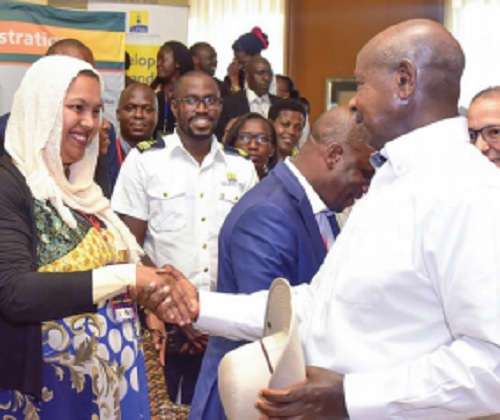
Kampala, Uganda | JULIUS BUSINGE | Uganda Revenue Authority must install big scanners at all entry and exit points to boost revenue collection, according President Yoweri Museveni.
President Museveni, who was speaking during the recently concluded symposium dubbed ‘first science model workshop’ organised by URA in partnership with the African Tax Administration Forum (ATAF) at Speke Resort Munyonyo, starting Nov.19-23, said the taxman must install scanners at the land borders, airports and railway points to curb smuggling, concealing and under-declaration of goods that leads to loss of revenue.
Presently, only two border posts –Busia and Malaba – have been installed with scanners out of the 40 gazetted entry and exit points.
President Museveni said the scanners should be linked electronically to a central system to quicken determination of what is in the trailers or containers.
He also suggested that there should be electronic monitoring and stamping of the products in factories within and without the country to minimize under-declaration of taxes.
“There must also be electronic monitoring of telephone calls because the telecoms have been under-declaring their revenues,” he said, arguing that URA might be losing taxes from telecoms given that they rely on their figures.
He also suggested that URA and Bank of Uganda electronically monitor all money transfers starting with the recently introduced mobile money tax.
This comes as URA hopes to collect an additional Shs1.9trillion to hit the new Shs16.3trillion revenue target this financial year amidst several years of missed targets.
URA Acting Commissioner General, Patrick Mukiibi, said the taxman has been using the science approach that involves scientific and analytical tools since 2008 as one measure to net those trying to dodge paying taxes and thus complementing conventional tax compliance initiatives.
He explained that the analytical science helps them determine the composition of products or goods and to understand their exact value and the taxes to levy.
He said the goods that are being tested using this approach include, rice, building tiles, crude oil and textiles.
“Sometimes we need to interrogate the books beyond the financial statements,” he said adding, “the more the URA is empowered, the more likely it will discover any hidden income.”
He said it is on this basis that the taxman is bringing in digital stamps to help them trace the origin of imported goods to fight counterfeit but also collect more revenue.
He also said URA has two science laboratories – one on forensics that deals with document checks and the analytical science lab that deals with testing the actual composition of goods.
Tax payers speak out
Speaking to journalists on the sidelines of the workshop, the Uganda Manufacturers Association Chairperson, Barbara Mulwana, said the science approach is helping taxpayers to predict their tax obligations.
Patrick Bitature, the chairman of the Private Sector Foundation Uganda said they welcome the new innovation.
He said it continues to enhance the way URA collect tax but also hel in leveling the playing field for taxpayers.
He added that it is through science and technology that all private sector players would be compelled to pay taxes to enable provision of social services.
 The Independent Uganda: You get the Truth we Pay the Price
The Independent Uganda: You get the Truth we Pay the Price





